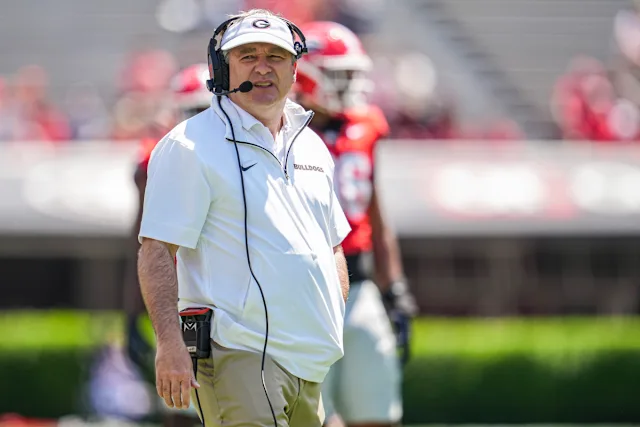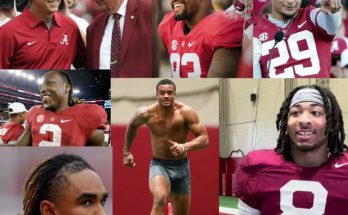The Georgia Bulldogs have long prided themselves on developing elite quarterback talent and maintaining one of the most stable and competitive quarterback rooms in the nation. However, as the landscape of college football continues to evolve with the rise of the transfer portal and the growing influence of NIL deals, even a powerhouse like Georgia must adapt. With the departure of their recent starter and a host of other dominoes falling, Kirby Smart and his staff are unveiling a revamped plan for the quarterback position that reflects a strategic shift in how the Bulldogs intend to remain dominant in the SEC and nationally.
At the center of Georgia’s new quarterback strategy is a recalibrated approach to the transfer portal. In the past, the Bulldogs have relied heavily on homegrown talent—players recruited, developed, and groomed for the system over multiple seasons. That method brought tremendous success, from Jake Fromm to Stetson Bennett and most recently, Carson Beck. But with Beck’s departure—whether to the NFL or a high-profile transfer—Georgia found itself in unfamiliar territory: needing to quickly evaluate both its internal options and the available talent pool outside the program.
What followed was a careful, deliberate internal audit. Kirby Smart and offensive coordinator Mike Bobo turned their attention to the quarterbacks already on the roster. Gunner Stockton, a redshirt sophomore who has patiently waited his turn, suddenly found himself in pole position. Stockton had flashed promise in limited opportunities, showing a confident pocket presence, a live arm, and the kind of mobility that complements Georgia’s evolving offensive philosophy. While not yet proven as a full-time starter, Stockton has the support of the coaching staff and, more importantly, the locker room.
But Georgia’s quarterback room doesn’t begin and end with Stockton. The Bulldogs are also high on Ryan Puglisi, a strong-armed redshirt freshman with a high football IQ and impressive pedigree coming out of Connecticut. Puglisi’s commitment to the program despite offers and interest from other blue-bloods speaks volumes about the culture Georgia has built and the faith players have in its development pipeline. Coaches have raved about his leadership in the film room and his competitive fire, and though he lacks in-game experience, he is expected to push Stockton hard during spring and fall camps.
With those two at the top of the depth chart, Georgia’s initial inclination was to resist reaching for a splashy name in the portal. Unlike some programs that immediately pursue a headline-grabbing transfer, Georgia’s plan is more nuanced. The Bulldogs are indeed open to exploring the portal but are not seeking a guaranteed starter. Instead, they’re looking for a depth piece—ideally a veteran quarterback who brings experience, leadership, and is comfortable serving as insurance rather than demanding immediate playing time.
That kind of addition would resemble the role that Stetson Bennett once held before seizing his moment and becoming a two-time national champion. Georgia isn’t necessarily looking for the next Bennett, but they are seeking someone with similar maturity and team-first attitude. The ideal candidate would be a graduate transfer with multiple years of playing experience who values the opportunity to be part of a national title contender, even if it means starting as a backup.
Meanwhile, Georgia is being intentional with its messaging. Internally, the staff has emphasized that this is not a sign of panic, but of preparation. Externally, recruits and their families are being told the same thing: that Georgia remains committed to developing from within, but will use the portal strategically to protect its depth and ensure readiness for a grueling SEC slate.
That messaging appears to be resonating. Georgia recently secured commitments from two promising high school quarterbacks in the 2025 and 2026 classes, including a top-10 national prospect who cited the Bulldogs’ “professional approach” and “transparency” as key reasons for his pledge. The staff’s honesty about competition, combined with Georgia’s winning pedigree, is proving to be a powerful draw—even in an era where some programs make promises they can’t keep.
Of course, the quarterback room has also undergone its share of attrition. Jaden Rashada, a former blue-chip recruit who briefly transferred to Georgia, has already moved on again, citing a desire for immediate playing time. While his departure raised eyebrows, those inside the program insist it was a mutual parting and that the coaching staff wants players fully committed to the long-term process. Others on the depth chart have also evaluated their situations, and while a few names may yet enter the portal after spring ball, the Bulldogs believe they will retain their core.
In addition to Stockton and Puglisi, Georgia has welcomed true freshmen Hezekiah Millender and Ryan Montgomery, both of whom will likely redshirt this year. These two represent the next generation of Bulldog quarterbacks—talented, coachable, and hungry to learn. They’ll benefit from a year of seasoning behind more experienced players and are expected to factor into future competitions.
The other element of Georgia’s evolving strategy is how they plan to tailor their offensive scheme to their quarterbacks’ strengths. Under Bobo, the Bulldogs have shown flexibility, and this year will be no different. With a quarterback room that skews younger, the staff is placing greater emphasis on simplifying reads, increasing play-action usage, and building packages that allow quarterbacks to make plays with their legs as well as their arms.
That means more rollouts, RPOs, and a run game designed to alleviate pressure. Georgia’s offensive line remains among the best in the country, and the Bulldogs have one of the deepest tight end rooms in the nation. Those assets will be leaned on heavily as the new quarterback settles in. Expect Georgia to use tempo and misdirection to keep defenses off balance and to give their quarterbacks clear pre-snap indicators.
Perhaps the biggest intangible in Georgia’s quarterback plan is the culture Kirby Smart has built. The Bulldogs have a track record of developing winners—not just statistically productive players, but leaders who elevate the team. Bennett embodied that ethos, and now it’s Stockton’s turn to prove he can do the same, or for Puglisi to show he’s ready if called upon. And if a savvy veteran comes in from the portal and competes well, all the better.
Ultimately, Georgia’s transfer portal plan at quarterback is defined by balance. They’re not chasing headlines, but they’re not standing pat either. They trust their evaluations, trust their development model, and trust their players. But they also recognize the importance of being proactive in a sport where injuries, surprises, and attrition can strike at any time.
What sets Georgia apart is their refusal to be reactionary. While other programs lurch from transfer to transfer, seeking quick fixes, the Bulldogs remain focused on the big picture: building a program where players are developed over time, competition is constant, and expectations never waver. Their quarterback plan reflects that ethos—a carefully calibrated blend of homegrown talent and smart additions, all in service of one goal: winning championships.
If that sounds simple, it’s not. Navigating the portal while maintaining locker room harmony is a delicate task. But Georgia seems to have cracked the code. As the 2025 season approaches, all eyes will be on the quarterbacks in Athens. The depth chart may still be fluid, and surprises may still come. But one thing is certain: the Bulldogs have a plan. And history suggests that when Georgia has a plan, the rest of college football should take notice.



